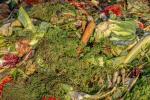Sustainable Management of Agri-Food Waste Operational Group: Energy Recovery of Slurry and Vinasse to Generate Energy and Biofertilizers
- Type Operational group
- Status In progress
- Execution 2024 -2025
- Assigned Budget 71.512,00 €
- Scope Autonómico
- Autonomous community Andalucía
The requested project proposes the valorization of effluents and waste from the agri-food sector (slurry and vinasse) for the production of bioenergy (biomethane) and a bioproduct that can be used for agronomic purposes or as a biofertilizer. The comprehensive treatment of agri-food waste has been previously tested in various projects developed within the "Biological Waste Treatment (BWT)" research line at the University of Cádiz (TEP-181 of the PAI), which involves applying the process in sequential thermophilic-mesophilic temperature phases.
Co-digestion of slurry and vinasse can increase energy efficiency in this sector. Furthermore, it can offer operational and economic advantages (sharing treatment facilities, unifying management methodologies, reducing investment and operating costs) and provide a solution to the environmental problems generated by this type of waste at the regional, national, and international levels. Additionally, the proposed temperature-phased process enables the digested final effluent to be classified as a Class A biosolid according to the EPA (Title 40 Code of Federal Regulations Part 503 (40CFR 503) for agricultural use. The overall treatment will also benefit from the destruction of VS, the reduction of COD, and the inactivation of pathogens (Salmonella and total and fecal coliforms).
The main outcome of the project is to obtain an optimized start-up and operation protocol for the sequential thermophilic-mesophilic temperature-phase anaerobic digestion process for the treatment of wine slurry and stillage. The project also aims to rapidly transfer the technology to wine and livestock facilities that currently lack an adequate treatment system.
- Optimize thermophilic and mesophilic processes in the anaerobic co-digestion of effluents and agri-food waste (vinasse and slurry).
- Optimize the sequential thermophilic-mesophilic anaerobic treatment of effluents and agri-food waste (slurry and vinasse).
- Analyze the characteristics of the final effluent for its classification as Class A Biosolid.
- To analyze the technical and economic feasibility of the sequential co-digestion process for effluents and agri-food waste (slurry and vinasse) for future scaling.
Promote renewable energy and the development of energy infrastructure in Andalusia to achieve a sufficient, decarbonized, smart, and high-quality energy system in the livestock and wine sectors, while boosting efficiency in the agricultural sector.
This innovative practice would bring livestock companies and research groups closer together, fulfilling the objectives set by the EAFRD. It promotes the generation of energy from biomass and the recycling of raw materials and byproducts through the formation of bioproducts.
The proposed technology allows both objectives to be achieved, as the process produces biogas in the form of methane and a stabilized liquid effluent with agronomic properties as a biofertilizer, using slurry and vinasse.
Optimize the treatment of anaerobic co-digestion in a sequential thermophilic-mesophilic phase of effluents and agri-food waste (slurry and vinasse) to achieve their comprehensive treatment and obtain, as final products, Methane and Class A Biosolids
- Coordinator/entity name: University of Cádiz
- Postal address: Reina Sofía Cultural Center, Paseo Carlos III No. 9, 11003 Cádiz
- Coordinator/entity email: otri@uca.es
- Telephone: 956015054
In accordance with rural development priorities and in relation to the knowledge transfer and innovation measures in the agricultural, forestry, and rural areas sectors contemplated by the Andalusian Rural Development Program, this Project contemplates the transfer of technology to the sectors involved, fostering the application and adaptation of knowledge, technologies, and patents, where appropriate. In our case, numerous companies in the water treatment, sludge management, and agri-food sectors are interested in the proposed technology, given that it represents an improvement from a technical, economic, and, above all, environmental perspective, addressing the problem generated by waste in their facilities. Thus, the project aims to address the real problem posed by the waste under study, which is a reality at the regional and local levels in our immediate surroundings, constituting a crucial element for university-business collaboration.
- Universidad de Cádiz
- Universidad de Cádiz (otri@uca.es)
- MONTESIERRA (administracion@montesierra.es)
- Universidad de Cádiz






